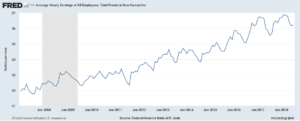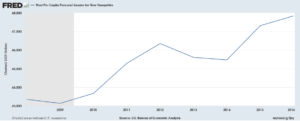September 2015
Daniel Hyland
In the effort to rejuvenate New Hampshire’s economy, occupational licensing is an important puzzle piece that is often overlooked. With the ostensible aim of protecting consumers, occupational licensing regulations set up barriers to entry, potentially preventing countless workers who would readily contribute to economic growth, but find themselves blocked by restrictive policies. The result for the consumer is higher prices and fewer choices.
Occupational Licensing: How New Hampshire Compares
Occupational licensing refers to any situation where someone wishing to enter a line of work must first apply to the government for permission to do so.[1] Obtaining a government license requires that job-seekers meet state-determined standards regarding age and education, as well as pay fees and pass related exams. A recent White House report notes that “about 25 percent of today’s U.S. workforce is in an occupation licensed at the State level, up from less than 5 percent in the early 1950s.”[2]
In their publication License to Work: A National Study of Burdens from Occupational Licensing, the Institute for Justice examines state-level licensing regulations on 102 low-to-moderate-income occupations, ranging from auctioneers and bartenders to tree trimmers and upholsterers. New Hampshire licenses only 34 of these 102 occupations. However, these occupations are often highly regulated, and New Hampshire’s licensing laws are the 28th most burdensome, as measured by the average requirements imposed on license applicants. That means New Hampshire is substantially worse off than Rhode Island, at 37th; and barely better than neighboring Massachusetts, at 25th.
Combining the number of occupations licensed by a state with the state’s average licensure burden yields the ranking criteria of “most broadly and onerously licensed state.” This makes the Live Free or Die state the 43rd most broadly and onerously licensed, slightly worse than Vermont at 44th.[3]
Some aspects of New Hampshire’s score in this study are particularly surprising. For instance, to obtain a city bus driver’s license requires 0 days of supervised education, but to become a cosmetologist requires 350 days of education and/or experience. To become a pharmacy technician, responsible for preparing and labeling medications and recording dosage information, the state requires a $25 fee, and nothing else; but to become a sign language interpreter costs $860, in addition to experience requirements and exams. New Hampshire requires 161 more days and $54 more to become licensed as a barber than as an emergency medical technician; and it is one of only 5 states to license shampooers–an occupation that both Hawaii, the most burdensomely regulated state in this study, and Arizona, the most broadly and onerously licensed state, do not regulate.[4]
Discrepancies like these point to deeper, underlying flaws. At 28th in terms of overall regulatory burden, New Hampshire needs to ask some questions about its licensing laws on the whole.
A view from 40,000 Feet:
In their report, the White House concludes that “current systems of licensure…place burdens on workers, employers, and consumers, and too often are inconsistent, inefficient, and arbitrary.”[5] Furthermore, such barriers significantly hamper the economic potential of “those who most likely aspire to [low-to-moderate income] occupations—minorities, those of lesser means and those with less education.”[6]
This is especially important in light of concerns regarding economic growth, since about half of the 102 occupations examined in the Institute for Justice’s study offer potential for new business creation (barbers, travel guides, and massage therapists, for example); and “about one-third of the 102 occupations are construction trades, such as masons, glaziers, painters and cement finishers, and in these trades, only those who act as contractors and have their own business need a license.”[7] This means that not only are job-seekers potentially barred from existing jobs due to these regulations, but new job creation is hindered as well.
To determine the areas most in need of reform, License to Work recommends asking whether an occupation is licensed in other states, whether a given state’s burdens are comparatively high, and whether licensure burdens in a given occupation are relatively high compared to occupations with greater safety concerns.[8]
Questions like these help to identify the shortcomings of regulations, and to determine whether licensing laws address a genuine harm or are only in place to artificially restrict the available supply of labor, thus allowing licensed workers to charge higher wages for their services. Since many licensed occupations offer potential for job creation, there is the risk that licensing regulations could be influenced by existing businesses, who would naturally want to limit any competition. This is known as “regulatory capture,” where the control of a regulatory body is used for private gain at the public’s expense.
There is ample reason to suspect such ulterior motives in any instance of licensing. A recent study found that “where government licensing is required for the job it raises hourly wages by about 8.4 percent.” The study also noted that it was unclear whether such gains are the result of conscious endeavors to artificially raise wages, or of workers having “acquired reputations that are valued in the market place.”[9] But there is evidence to suggest a conscious effort on the part of vested interests to restrict competition. As pointed out by the Council on Licensure, Enforcement and Regulation (CLEAR), “professions rather than consumer groups usually seek regulation,”[10] and licensure laws often “require entrants into a trade to pass exams…designed and graded by representatives of incumbent suppliers.”[11]
These circumstances suggest that businesses and workers are using the regulatory system for private gain, contrary to its intended purpose of protecting the well-being of the general public.
What Are the Alternatives?
In many states, licensing regulation is accompanied by what are known as “sunrise” and “sunset” laws. Sunrise refers to “a process under which an occupation or profession wishing to receive state certification or licensure must propose the components of the legislation, along with cost and benefit estimates of the proposed regulation…[and] convince the legislators that consumers will be unduly harmed if the proposed legislation is not adopted,” and “Sunset is the automatic termination of regulatory boards and agencies unless legislative action is taken to reinstate them.”[12] These common-sense measures provide basic and necessary accountability for regulators, requiring them to provide justification for new laws to be created, and for existing laws to persist.
New Hampshire however, has no sunrise law, and its sunset law was repealed.[13] In order to reform its regulatory legislation, state policymakers may resort to the introduction of new legislation–and in fact, there are two examples of this from recent years. House Bill 446, introduced in 2011, would have repealed the legislative authority to regulate a number of professions. But despite a favorable committee recommendation, the bill ultimately failed to pass.[14] The bill’s main sponsors followed in 2012 with HB 1265, a more general bill which would have set criteria for occupational regulation, established a committee “to determine the appropriate level of regulation for each occupation and profession,” and provided for the practice of professions “without being subject to laws that regulate the occupation or profession which are arbitrary, unnecessary, or substantially burdensome.” This bill was referred to an interim study, after which it was eventually voted down.[15]
Such difficulties demonstrate a concern that sunrise and sunset laws aim to address: namely, that regulatory legislation may tend to be easy to pass, but hard to undo. [16] According to the Bureau of Labor Statistics, licensing regulation may be prone to this kind of outcome because of so-called “ratchet” effects: new licensing regulations often include “grandfather” clauses, which allow existing practitioners to continue their work without being subject to the new requirements. Because of this, a newly licensed market looks essentially the same as it did prior to regulation, and prices will tend to remain what they were. Consequently, the increase in wages discussed earlier may not occur immediately. However, as time goes on the grandfathered workers begin to exit the field, leaving mostly licensed workers who are protected from competition by the licensure laws; in this new situation, “de-licensing” may cause wages “to fall immediately with the inflow of new workers.” [17]
Perhaps this explains why there have been only eight instances of successful de-licensing in the last 40 years–and why, in half of those cases, attempts to reinstitute licensing regulations followed swiftly afterward. New Hampshire’s 2011-2012 reform efforts constitute one of only nine attempts nationwide in recent years to collectively de-license groups of occupations–all of them unsuccessful.[18]
Due to such concerns, it is important not only to address existing licensing regulations, but to be vigilant in scrutinizing proposed new licensure laws, and to explore alternatives to licensing.
One of the main alternatives to licensing is voluntary certification, which could be (and often is) offered privately, rather than through the government. Certification not only provides a lower-cost and less burdensome alternative, but significantly it can provide a clearer view of the genuine worth of standards in the eyes of practitioners and the public. By exposing certification requirements to ordinary market forces, a more appropriate balance can be reached between the standards set for practitioners, and the market demands on workers in a given profession.[19]
Conclusion
The White House report on occupational licensing concludes that there “is ample evidence that States and other jurisdictions should review current licensing practices with an aim toward rationalizing these regulations and lowering barriers to employment.”[20] To do this, New Hampshire should examine what measures are already in place to oversee licensing regulations, and cast a critical eye upon the motives that may underlie licensing requirements to ensure that any regulation protects both individual freedom and economic growth. Lowering barriers to entry means greater marketplace competition, with all the benefits that follow: lower prices, higher quality, and more consumer choice–and ultimately, more freedom and more growth in New Hampshire.
Click here to download a pdf version of this report
Appendix I:
Selected Occupations that Require a License to Practice in New Hampshire and their Requirements to Obtain
| Burden Rank |
Occupation |
Number of States that License |
Fees |
Education/Experience (in days) |
Exams |
Estimated Employment (as of May 2013) |
| 1 |
Preschool Teacher |
49 |
$130 |
1,825 |
2 |
2670 |
| 2 |
Athletic Trainer |
46 |
$450 |
1,460 |
1 |
130 |
| 3 |
Earth Driller |
47 |
$260 |
1,095 |
1 |
100 |
| 4 |
Midwife |
29 |
$920 |
730 |
3 |
40 |
| 5 |
School Bus Driver |
51 |
$80 |
732 |
6 |
310 |
| 6 |
Mobile Home Installer |
39 |
$75 |
731 |
0 |
70 |
| 7 |
Cosmetologist |
51 |
$124 |
350 |
2 |
320 |
| 8 |
Barber |
50 |
$124 |
187 |
2 |
# |
| 9 |
Massage Therapist |
39 |
$125 |
175 |
2 |
50 |
| 10 |
Makeup Artist |
36 |
$154 |
140 |
3 |
– |
| 10 |
Skin Care Specialist |
50 |
$154 |
140 |
3 |
40 |
| 12 |
Manicurist |
50 |
$119 |
70 |
2 |
310 |
| 13 |
Sign Language Interpreter |
16 |
$860 |
2 |
3 |
210 |
| 14 |
Cathodic Protection Tester |
16 |
$1,500 |
8 |
2 |
120 |
| 15 |
Animal Trainer |
20 |
$0 |
90 |
0 |
50 |
| 16 |
Bus Driver (City/Transit) |
51 |
$70 |
0 |
5 |
330 |
| 17 |
Truck Driver |
51 |
$60 |
0 |
4 |
6410 |
| 18 |
Emergency Medical Technician |
51 |
$70 |
26 |
2 |
110 |
| 19 |
Pest Control Applicator |
51 |
$20 |
0 |
3 |
190 |
| 19 |
Vegetation Pesticide Handler |
51 |
$20 |
0 |
3 |
– |
| 21 |
Shampooer |
5 |
$25 |
35 |
0 |
# |
| 22 |
Weigher |
24 |
$106 |
0 |
1 |
– |
| 23 |
Travel Guide |
21 |
$60 |
0 |
1 |
370 |
| 24 |
Pharmacy Technician |
12 |
$25 |
0 |
0 |
– |
| 25 |
Child Care Worker |
33 |
$27 |
0 |
0 |
2690 |
| 26 |
Auctioneer |
33 |
$115 |
19 |
1 |
– |
| 27 |
Slot Key Person |
21 |
$510 |
0 |
0 |
– |
| 27 |
Gaming Supervisor |
23 |
$510 |
0 |
0 |
– |
| 29 |
Animal Breeder |
26 |
$200 |
0 |
0 |
– |
| 30 |
Coach (School Sports) |
24 |
$45 |
1 |
0 |
1220 |
| 31 |
Taxidermist |
26 |
$50 |
0 |
0 |
– |
| 31 |
Fisher |
41 |
$50 |
0 |
0 |
– |
| 33 |
Gaming Dealer |
24 |
$40 |
0 |
0 |
– |
| 34 |
Security Guard |
37 |
$20 |
0 |
0 |
2250 |
| |
|
|
|
# included with Cosmetologist |
[1] Donald J. Boudreaux, “Occupational Licensing: Reality Differs from Rhetoric,” Pittsburgh Tribune-Review, March 25, 2014, accessed July 31, 2015, http://mercatus.org/expert_commentary/occupational-licensing-reality-differs-rhetoric
[2] “Occupational Licensing: A Framework for Policymakers,” White House, accessed July 31, 2015, https://www.whitehouse.gov/sites/default/files/docs/licensing_report_final_nonembargo.pdf
[3] “License to Work: A National Study of Burdens from Occupational Licensing,” Institute for Justice, http://www.ij.org/LicenseToWork
[4]ibid., “State Profiles: New Hampshire,” http://licensetowork.ij.org/nh
[5] “A Framework for Policymakers.”
[6] Institute for Justice, conclusion, http://www.ij.org/l2w-conclusion
[7] ibid., “The Occupations,” http://www.ij.org/l2w-occupations
[8] ibid., Conclusion.
[9] Morris M. Kleiner, “Analyzing the Labor Market Outcomes of Occupational Licensing,” Cato Institute: Research Briefs in Economic Policy 26 (2015) http://object.cato.org/sites/cato.org/files/pubs/pdf/research-brief-26-updated.pdf
[10] “Sunset, Sunrise, and State Agency Audits,” Council on Licensure, Enforcement & Regulation, accessed July 31, 2015, http://www.clearhq.org/resources/sunset.htm
[11] Boudreaux, “Reality Differs from Rhetoric.”
[12] “Sunrise, Sunset & State Agency Audits.”
[13] ibid.
[14] HB446 of 2011 Session of the New Hampshire General Court
[15] HB1265 of 2012 Session of the New Hampshire General Court
[16] “A Framework for Policymakers.”
[17] Robert J. Thornton and Edward J. Timmons, “The de-licensing of occupations in the United States,” Bureau of Labor Statistics: Monthly Labor Review (May, 2015) http://www.bls.gov/opub/mlr/2015/article/pdf/the-de-licensing-of-occupations-in-the-united-states.pdf
[18] Ibid.
[19] Edward J. Timmons, “‘Occupational Licensing Gone Wild?’: Why Licensing Is Not Always the Answer” (testimony presented before the Indiana Senate Commerce and Technology Committee, April 16, 2015.) http://mercatus.org/publication/occupational-licensing-gone-wild-why-licensing-not-always-answer
[20] “A Framework for Policymakers.”









